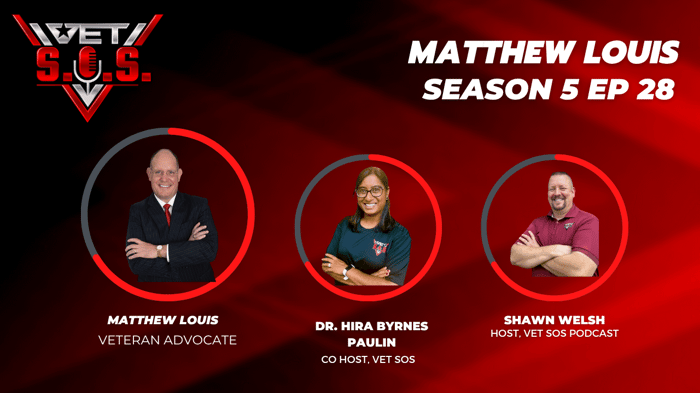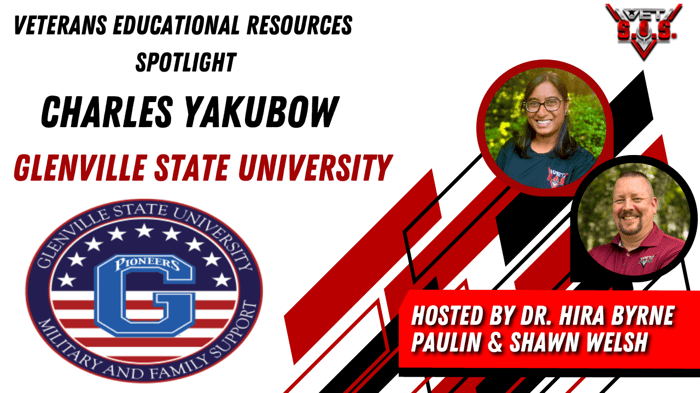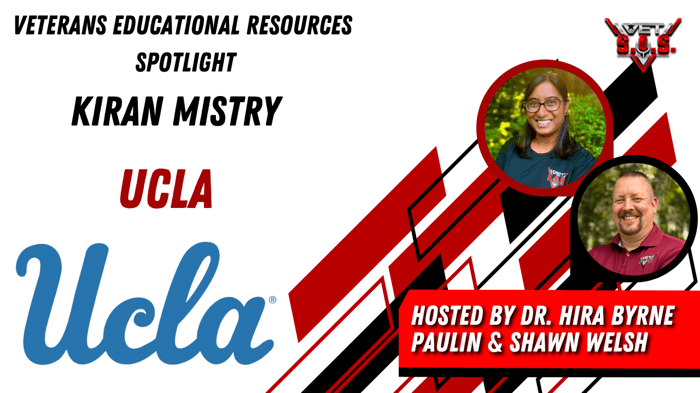Veteran Employment Support: Matthew Louis’ Tactical Blueprint for Successful Military Transition
For many service members, transitioning from active duty to civilian life can feel like stepping into uncharted territory. While the military provides structure, purpose, and identity, the civilian workforce presents a different challenge entirely. That's why veteran employment support is one of the most crucial—and often misunderstood—components of a successful transition.
In a compelling episode of the VET S.O.S. Podcast, hosts Shawn Welsh and Dr. Hira spoke with Matthew Louis, a recognized military transition expert and author of Mission Transition and Hiring Veterans. Louis offers a tactical, data-driven, and deeply personal perspective on how veteran employment support can shape lives, build careers, and close the persistent civil-military divide.
A Personal Journey That Shaped a National Mission
 Matthew Louis
Matthew LouisMatthew Louis brings an unparalleled depth of experience to the subject. As a West Point graduate, Army tanker, and senior corporate consultant, Louis has lived both sides of the transition process. His own journey began during the 1990s military drawdown—a time when transitioning service members faced limited resources and an uncertain job market.
Rather than leap directly into the workforce, Louis pursued graduate education as a strategic detour to reorient, re-skill, and prepare for the civilian world. This deliberate approach helped him acquire essential competencies, deprogram from military life, and understand the cultural differences in the private sector.
His experience ignited a passion to ensure other veterans didn’t have to walk the same road alone. Over time, he began offering guidance to fellow veterans—an act of service that eventually led to a larger vision: improving veteran employment support across the nation.
The Three-Legged Strategy to Improve Veteran Employment
Louis’s framework for change is built on what he describes as a "three-legged stool" approach:
Mission Transition (Book) – A comprehensive guide tailored for veterans and service members navigating the job market.
Hiring Veterans (Book) – A manual for employers and HR leaders to build veteran-inclusive hiring programs.
Peer Post (Tech Platform) – A free, web-based employment tool that translates military experience into civilian job competencies and matches veterans with jobs.
Each leg of the stool plays a unique role in offering scalable and strategic veteran employment support—whether you're a job seeker or a hiring manager.
Employment as the Silver Bullet
Throughout the podcast episode, Louis makes one point abundantly clear: Employment is the single most important factor in a veteran’s post-military success.
“It’s the silver bullet,” he explains. “If you can help a veteran find the right job—one aligned with their values, skills, and goals—you solve a wide range of downstream issues related to health, finances, and mental well-being.”
This viewpoint aligns with growing research linking employment stability to other positive social determinants of health. Louis argues that the right veteran employment support doesn’t just benefit the veteran—it uplifts families, strengthens communities, and contributes to national workforce development.
Peer Post: Technology-Driven Employment Support
To solve one of the biggest challenges in veteran employment—skill translation—Louis helped launch Peer Post, a revolutionary job-matching platform.
Peer Post allows veterans to build a “passport”—a LinkedIn-style profile that converts their military education, training, and duties into real-world competencies. This profile is then matched with job openings across the U.S., generating custom resumes and job applications in minutes. Most importantly, it’s 100% free for veterans, for life.
This kind of automation streamlines the job search process and eliminates guesswork, providing a major breakthrough in veteran employment support for those overwhelmed by the complexities of transition.
Helping Employers Understand the Value of Veterans
One of the most unique aspects of Louis’s work is his emphasis on educating employers. His second book, Hiring Veterans, is a practical guide to help organizations develop veteran hiring strategies, improve onboarding practices, and foster veteran-friendly work cultures.
Louis points out that many employers still don’t know how to interpret military resumes or leverage the leadership and problem-solving abilities veterans bring. That’s where veteran employment support must include both sides of the equation—preparing veterans for civilian careers and preparing employers to receive them.
He also highlights the often-overlooked military spouse population, explaining that they, too, need resources and recognition from hiring managers. Spouses bring adaptability, resilience, and diverse experience—traits that can enhance any organization.
Addressing Senior Leaders and Complex Transitions
Looking ahead, Louis is working on a third book designed specifically for general officers and senior enlisted leaders. Although these individuals may seem the most prepared for post-military life, they often face the toughest transitions.
“The longer you’ve been in uniform, the harder it can be to shift into a civilian mindset,” Louis explains. “And yet, these are some of the most skilled and experienced professionals in the country. If we don’t provide them with focused veteran employment support, we miss out on tremendous leadership potential.”
His new book aims to fill that gap, offering tailored resources for senior leaders stepping into high-level roles in government, business, or nonprofit sectors.
Localized Solutions: Veteran Collaboratives
Beyond writing and tech innovation, Louis is also a strong advocate for veteran collaboratives—regional alliances that help connect veterans with services in their area. These collaboratives act as one-stop shops where veterans can access healthcare, housing, financial services, and employment support without needing to search dozens of separate organizations.
Louis mentions standout examples like Combined Arms in Houston, which coordinates over 1,000 VSOs under one unified system. “Veteran collaboratives simplify access and make support efficient,” he says. “They’re a model for how we can scale meaningful veteran employment support nationwide.”
Where to Find His Resources
Louis offers a wealth of free content and guidance through his website, www.matthewjlouis.com. Visitors can access:
21 video courses
A 450-page downloadable workbook
Free contact access for one-on-one advising
Employer-facing resources and best practices
Direct links to Peer Post and other tools
Final Thoughts: Redefining the Transition Narrative
Matthew Louis is more than just an author—he’s an architect for a better transition system. His blend of lived experience, professional insight, and a relentless commitment to service makes him a cornerstone in the movement for better veteran employment support.
Whether you’re a transitioning service member, a military spouse, a hiring manager, or a policymaker, his message is clear: meaningful employment changes lives. It’s time to move beyond ceremonial support and offer veterans the tools they need to thrive.





